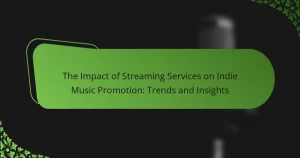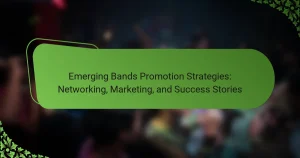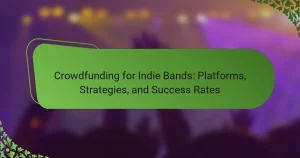Building a thriving indie music community requires effective networking, strong support systems, and access to essential resources. Networking enhances collaboration and exposure among artists. Support from mentors and resources like recording studios can significantly advance careers. Engaging in local events and online platforms fosters relationships and creates a sense of belonging within the community.
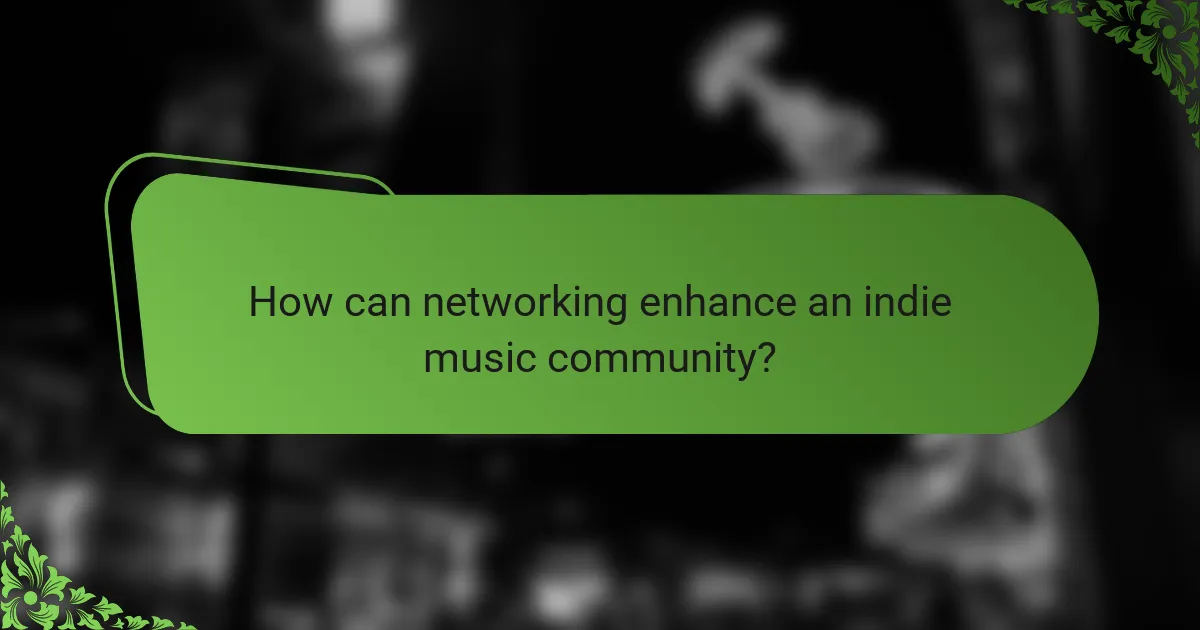
How can networking enhance an indie music community?
Networking enhances an indie music community by fostering connections, collaboration, and resource sharing. It allows artists to exchange ideas, gain exposure, and access opportunities. Strong networks provide support systems that can lead to joint projects, performances, and promotions. Additionally, networking can attract industry professionals who can offer valuable insights and guidance.
What are the key networking strategies for indie musicians?
Key networking strategies for indie musicians include building relationships with local venues, collaborating with other artists, leveraging social media platforms, and participating in music festivals. These strategies foster community support and enhance visibility. Engaging with music industry professionals and attending workshops can also provide valuable resources and connections. Networking is essential for growth and opportunity in the indie music scene.
Which platforms are most effective for connecting with other artists?
Social media platforms like Instagram, Facebook, and Twitter are effective for connecting with other artists. These platforms foster community engagement and collaboration. Instagram allows visual storytelling, while Facebook groups enable focused discussions. Twitter is great for real-time interactions and sharing updates. Additionally, platforms like Bandcamp and SoundCloud provide spaces for artists to share their work and connect with peers.
How do local music events foster community connections?
Local music events foster community connections by creating shared experiences that bring people together. These gatherings promote collaboration among artists, encourage local support for musicians, and facilitate networking opportunities. As a result, attendees develop relationships that strengthen community bonds. Moreover, these events often showcase diverse musical talents, reflecting the unique cultural identity of the area. This engagement not only boosts local pride but also enhances the overall vibrancy of the community.
What role do social media groups play in indie music networking?
Social media groups are crucial for indie music networking as they foster collaboration and support among artists. These platforms enable musicians to share resources, promote their work, and connect with fans and industry professionals. Groups often facilitate discussions, feedback, and opportunities for live performances or collaborations. Unique interactions within these communities can lead to increased visibility and growth for indie artists. As a result, social media groups serve as vital hubs for building a supportive indie music ecosystem.
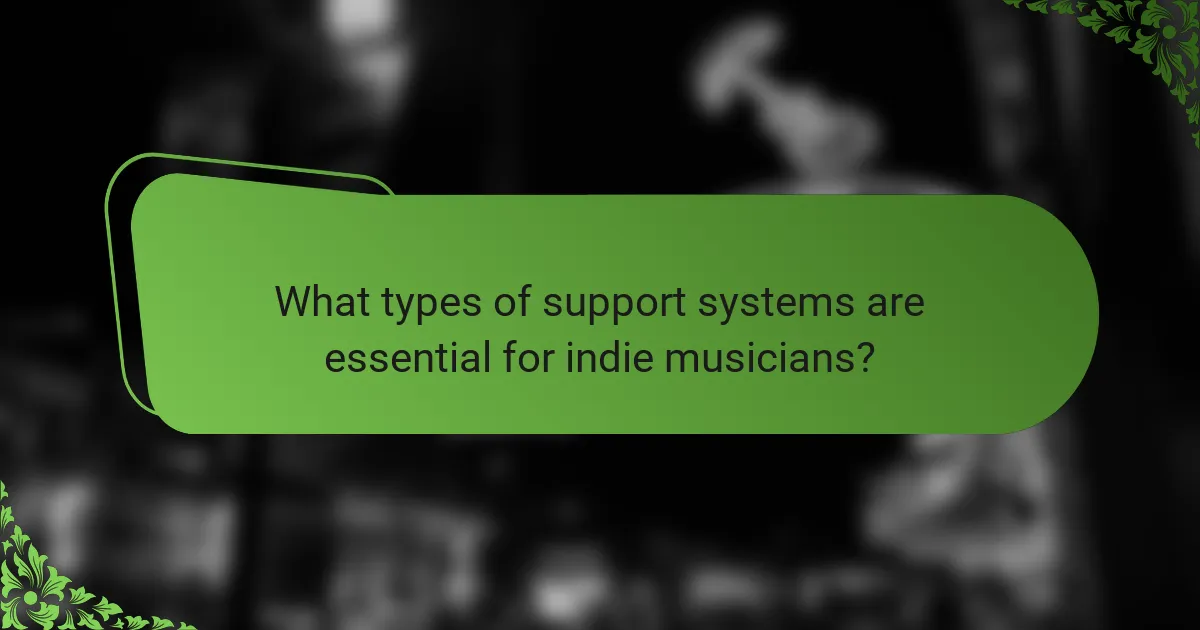
What types of support systems are essential for indie musicians?
Indie musicians need strong support systems that include networking opportunities, mentorship, and access to resources. Building connections with fellow artists and industry professionals is crucial for collaboration and exposure.
Mentorship from experienced musicians can provide guidance and insight into navigating the music industry. Access to resources such as recording studios, promotional platforms, and financial advice can significantly enhance an indie musician’s career.
Participating in local music events and online communities fosters relationships and creates a sense of belonging. These support systems ultimately contribute to the sustainability and growth of an indie music career.
How can mentorship programs benefit emerging artists?
Mentorship programs significantly benefit emerging artists by providing guidance, networking opportunities, and access to resources. These programs connect artists with experienced mentors who share industry knowledge and insights. As a result, participants can enhance their skills, build confidence, and navigate the complexities of the music industry more effectively. Additionally, mentorship fosters a sense of community, encouraging collaboration and support among artists, which can lead to new creative opportunities and projects.
What are the advantages of joining music collectives or cooperatives?
Joining music collectives or cooperatives offers numerous advantages, including networking opportunities, shared resources, and collaborative support. Members gain access to industry contacts, which can enhance visibility and career growth. Additionally, these groups often provide collective marketing efforts, reducing individual costs. The cooperative model fosters creativity and innovation, allowing artists to collaborate and share skills. Finally, being part of a community can offer emotional support, helping artists navigate the challenges of the music industry.
How do crowdfunding platforms support indie music projects?
Crowdfunding platforms significantly support indie music projects by providing financial resources, community engagement, and exposure. These platforms allow artists to connect directly with fans, fostering a sense of belonging and collaboration.
They offer various funding options, enabling musicians to raise money for recording, marketing, and touring. For instance, platforms like Kickstarter and Indiegogo allow artists to set funding goals and reward backers with exclusive content.
Additionally, crowdfunding encourages artists to build a loyal fan base, as supporters often feel invested in the project’s success. This engagement can lead to increased visibility and opportunities for collaboration within the indie music community.
Ultimately, crowdfunding platforms serve as vital resources for indie musicians, enhancing their ability to create and share their music while connecting with a supportive audience.
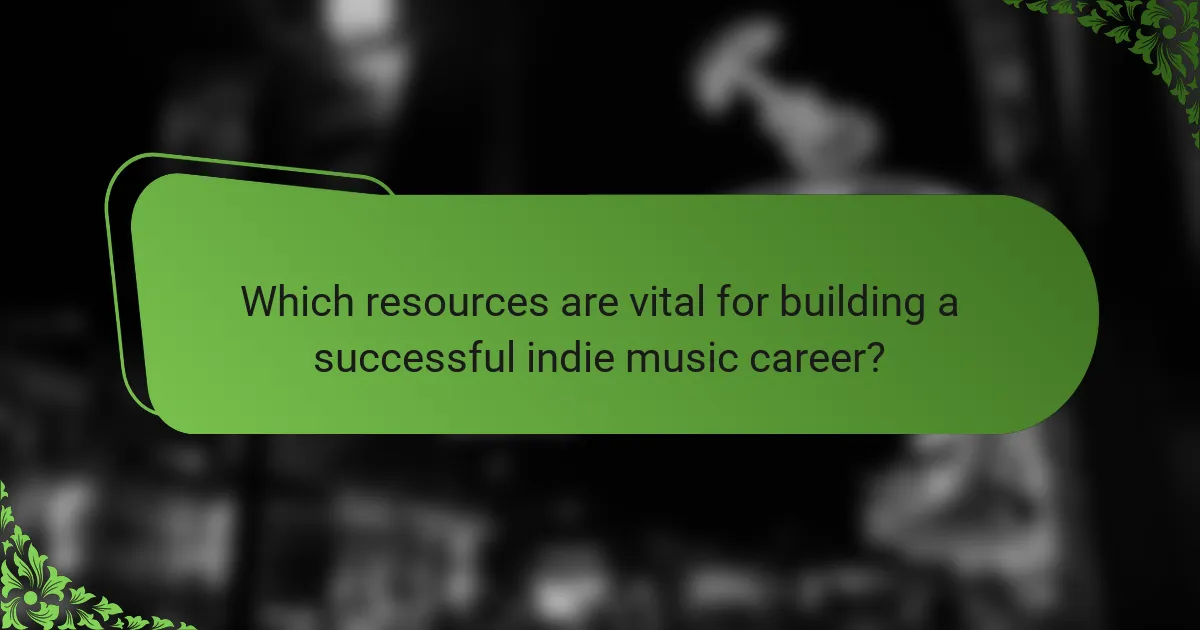
Which resources are vital for building a successful indie music career?
Building a successful indie music career requires vital resources including networking opportunities, support systems, and educational tools. Key resources consist of local music venues, online platforms, and community groups that foster collaboration.
1. Networking Events: Attend music festivals, showcases, and industry conferences to connect with other artists and professionals.
2. Online Communities: Join social media groups and forums dedicated to indie music for sharing experiences and advice.
3. Music Education: Utilize online courses and workshops to enhance skills in songwriting, production, and marketing.
4. Collaboration Spaces: Seek out co-working studios and rehearsal spaces that encourage creative partnerships.
5. Funding Resources: Explore grants, crowdfunding platforms, and sponsorship opportunities to finance projects.
6. Promotional Tools: Leverage social media, streaming services, and music blogs to reach a wider audience.
These resources collectively contribute to building a supportive indie music community.
What tools can help with music production and distribution?
Various tools can enhance music production and distribution for indie artists. Digital audio workstations (DAWs) like Ableton Live and FL Studio offer robust production features. Distribution platforms such as DistroKid and TuneCore facilitate reaching streaming services. Collaboration tools like Splice enable artists to connect and share projects. Additionally, social media platforms provide essential networking opportunities for community building. These resources support indie musicians in creating and promoting their work effectively.
How do educational workshops and seminars contribute to skill development?
Educational workshops and seminars enhance skill development by providing hands-on experience and networking opportunities. These events foster collaboration among indie musicians, allowing them to share knowledge and resources. Participants gain insights from industry professionals, which can lead to unique creative approaches. Additionally, workshops often cover practical skills such as marketing, production, and performance techniques, crucial for building a successful music career.
What online resources are available for indie musicians?
Indie musicians can access various online resources that foster networking, support, and collaboration. Key platforms include social media groups, music forums, and dedicated websites for indie artists.
1. Social Media Groups: Platforms like Facebook and Reddit host groups where indie musicians share experiences and tips.
2. Music Collaboration Platforms: Websites like SoundBetter connect musicians with producers and collaborators.
3. Streaming Services: Platforms like Bandcamp enable artists to distribute music directly to fans.
4. Educational Resources: Websites such as Coursera and YouTube offer courses on music production and marketing.
5. Grant and Funding Platforms: Sites like Patreon provide funding opportunities through fan subscriptions.
6. Industry Networks: Organizations like the Independent Music Publishers International Forum support indie musicians through networking events and resources.
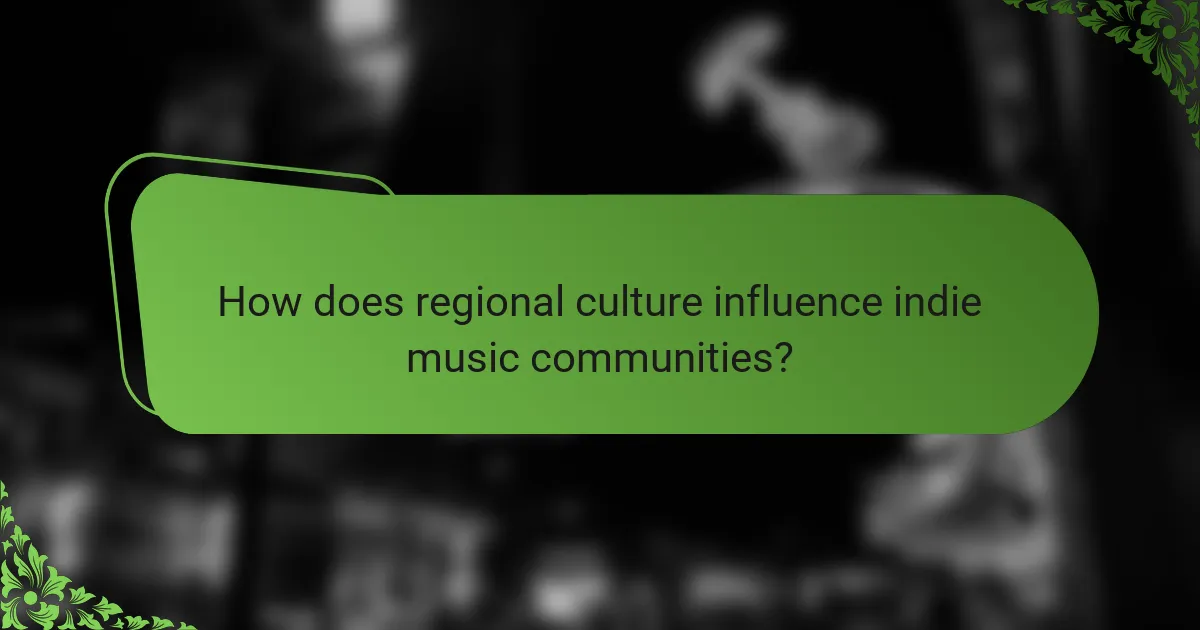
How does regional culture influence indie music communities?
Regional culture significantly shapes indie music communities by influencing musical styles, themes, and collaboration opportunities. Local traditions and social norms create distinct sounds and foster unique artistic expressions. For example, regional festivals often serve as networking hubs, enhancing community support. Additionally, cultural values can dictate the resources available to artists, impacting their growth and sustainability. This interplay between culture and music cultivates a vibrant indie scene that reflects local identities.
What are the unique challenges faced by indie musicians in different regions?
Indie musicians face unique challenges based on their region, including limited access to resources, varying levels of community support, and different cultural expectations. In urban areas, competition is fierce, while rural musicians may struggle with isolation. Access to venues and local audiences can significantly impact their visibility and growth. Additionally, regional differences in music genres can influence the type of support available, affecting networking opportunities. Understanding these regional dynamics is essential for building a supportive indie music community.
How do local genres shape the indie music scene?
Local genres significantly influence the indie music scene by fostering unique sounds and community connections. These genres create a distinct identity for local artists, encouraging collaboration and support among musicians. As a result, indie music communities thrive through shared experiences and resources tailored to specific cultural contexts. Local influences often lead to the emergence of niche sub-genres, enriching the overall diversity of the indie music landscape. The interplay between local culture and music not only shapes artistic expression but also strengthens audience engagement, making the indie scene more vibrant and accessible.
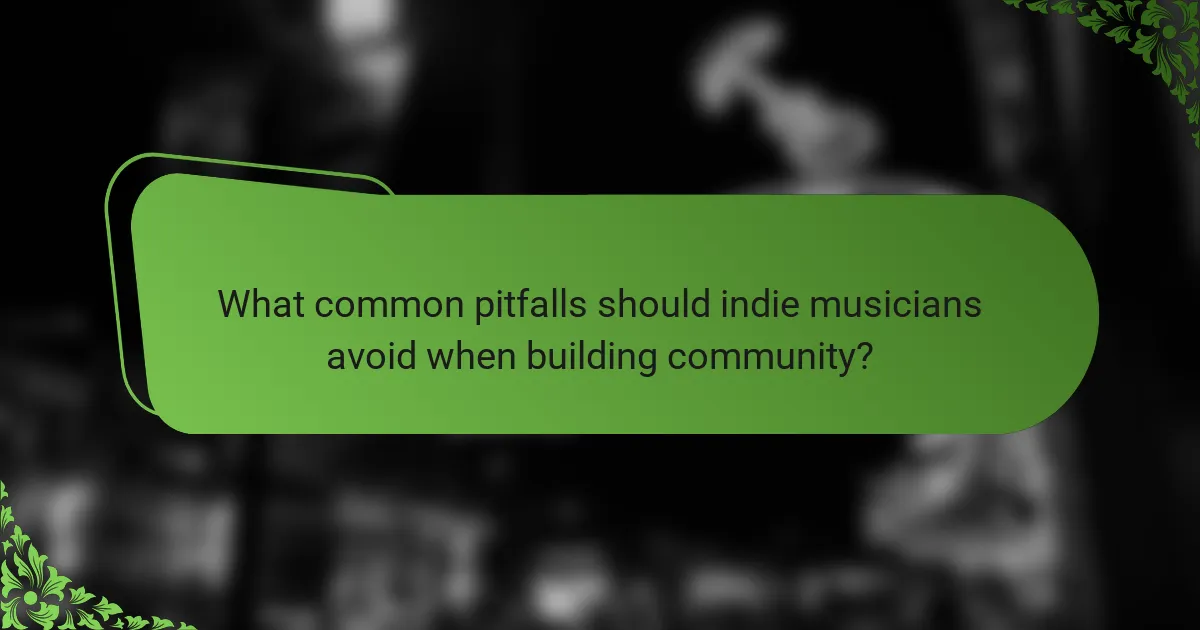
What common pitfalls should indie musicians avoid when building community?
Indie musicians should avoid common pitfalls like neglecting genuine engagement, over-promoting their work, and failing to diversify their community platforms. Building authentic connections fosters loyalty and support. Prioritize listening over self-promotion to create meaningful interactions. Avoid relying solely on social media; explore local events and collaborations for broader outreach.
How can poor networking impact an artist’s career?
Poor networking can severely hinder an artist’s career by limiting opportunities for collaboration, exposure, and support. Without strong connections, artists may struggle to find gigs, access resources, or build a loyal fan base. Networking fosters relationships that can lead to mentorship and valuable industry insights. A lack of networking can isolate artists, making it difficult to navigate the competitive landscape of the music industry. Ultimately, poor networking can stifle growth and diminish an artist’s chances of achieving long-term success.
What mistakes do musicians make when seeking support?
Musicians often make several mistakes when seeking support. They may fail to build genuine relationships, relying instead on superficial connections. Many overlook the importance of targeted networking, engaging with communities that align with their genre or goals. Additionally, they might not utilize available resources effectively, missing out on funding opportunities or mentorship programs. Finally, a lack of clear communication about their needs can hinder potential collaborations.
How can mismanagement of resources hinder growth?
Mismanagement of resources can severely hinder growth in an indie music community. Inefficient allocation of funds, time, and talent can lead to missed opportunities for collaboration and exposure. For example, if a community lacks proper funding for events, it may struggle to attract new members or artists, limiting its reach and impact. Additionally, poor communication and support structures can result in artists feeling isolated, which diminishes their motivation and engagement. Ultimately, effective resource management is crucial for fostering a thriving indie music community.
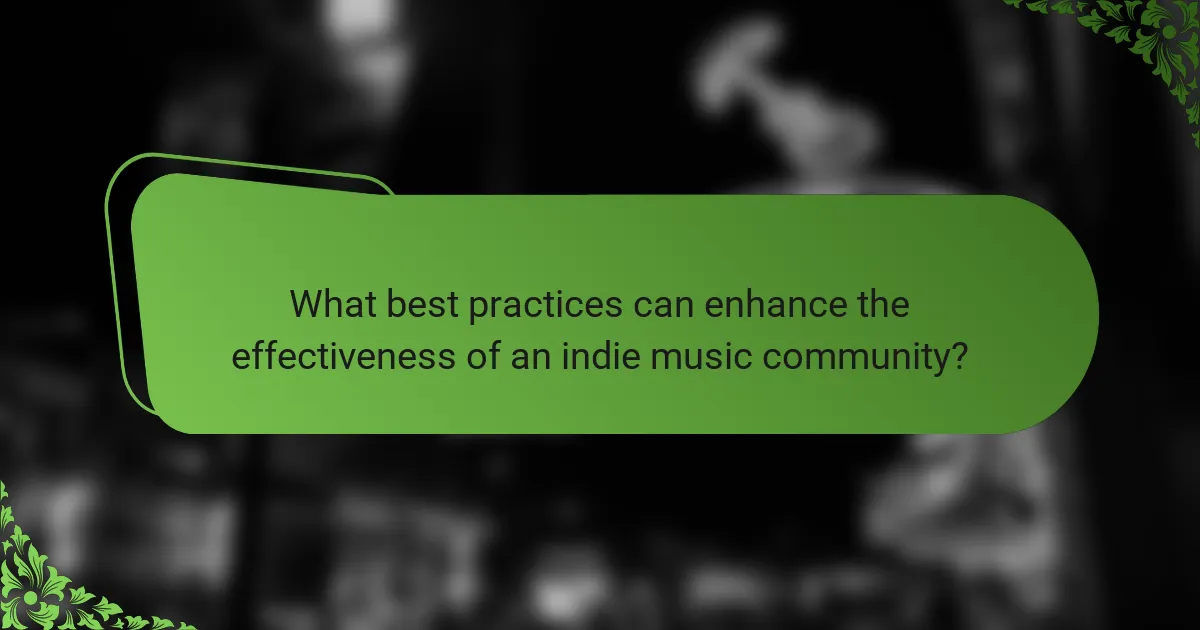
What best practices can enhance the effectiveness of an indie music community?
To enhance the effectiveness of an indie music community, focus on fostering connections, providing resources, and offering support. Building strong networks encourages collaboration among artists, which can lead to shared opportunities. Hosting regular events, both online and offline, creates spaces for interaction and relationship-building.
Establishing platforms for sharing knowledge, such as workshops or forums, empowers members with skills and insights. Promoting local talent through showcases can increase visibility and engagement within the community. Lastly, creating a supportive environment where feedback and encouragement are prioritized helps retain members and fosters growth.
How can collaboration among artists lead to greater success?
Collaboration among artists fosters greater success through shared resources, diverse perspectives, and mutual support. By networking, artists can access a wider audience and promote each other’s work. Collaborative projects often lead to innovative creations that attract attention and enhance individual visibility. Additionally, forming a community provides emotional support, which can boost motivation and resilience in the competitive indie music scene.
What strategies can strengthen community bonds?
To strengthen community bonds in an indie music community, foster collaboration and support among members. Organize regular events, such as open mic nights or jam sessions, to encourage interaction. Create online platforms for sharing resources, promoting local talent, and discussing industry trends. Establish mentorship programs that connect experienced musicians with newcomers, enhancing skill development and networking opportunities.
How can indie musicians leverage feedback for improvement?
Indie musicians can leverage feedback by actively engaging with their audience and peers. Constructive criticism helps refine their sound, enhance songwriting, and improve performance.
Seeking feedback through social media, live shows, and collaborations fosters community support. This interaction not only builds relationships but also provides insights into audience preferences.
Utilizing platforms like Bandcamp or SoundCloud allows musicians to gather listener feedback directly. Analyzing comments and reviews offers valuable data for artistic growth and direction.
Regularly incorporating feedback into their creative process can lead to unique musical attributes, distinguishing their work in a competitive landscape.
